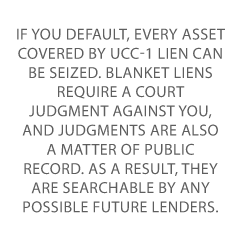
What Are UCC Filings?
Sometimes business funding is blocked by something we don’t see coming. For example, UCC filings can cause issues when you don’t even know they are out there, let alone what they are.
What Are UCC Filings?
UCC stands for the Uniform Commercial Code. This is a law covering commercial transactions in the United States. UCC filing starts when a company agrees to pledge assets to a lender. Then, all parties sign the agreement. The lender is then free to file a UCC lien against those assets.
The lender files a UCC-1 financing statement with the Secretary of State, which creates a lien. Like many things in life, a lien is first come, first served. That means, if two lenders try to take a lien on the same property, the one who files first will get priority if the borrower defaults on the loans.
You Can’t Hide a Lien
Liens are a matter of public record, meaning anyone can find out they are out there. So, it is important to understand how they are used. First, they’re used to protect creditors. Lenders can take the assets they have a lien on to make a debt whole in case of default. To avoid having a second lien, they can easily run a search for any outstanding liens. In fact, many states offer these searches online for reasonable fees.
They also allow for a business to borrow from more than one lender if specific collateral is different for each UCC-1 financing statement. Specific collateral liens are more common for special purposes like inventory financing or buying equipment.
What You Should Know About UCC Filings
A UCC-1 filing is active for five years. After that, it must be renewed by the lender if the loan term is longer. Also, a lender can also file updates to a UCC-1 in case of asset changes.
Typical assets subject to UCCs include:
- Receivables
- Office equipment
- Real estate
- Investment securities
- Inventory
- Vehicles
- Larger operating equipment
- Letters of credit
- Commercial instruments (usually promissory notes or drafts)
A lender can also get a blanket assignment, which lets a borrower legally transfer ownership of present and future accounts receivable as loan collateral. The creditor has a security interest in every business asset with a blanket assignment. These are more common when it comes to:
- Traditional bank loans
- Alternative business loans
- Loans from the SBA
Effects of UCC Filings on Funding
So, how do these liens affect funding? Well, if you default, every asset covered by UCC-1 lien can be seized. Blanket liens require a court judgment against you, and judgments are also a matter of public record. As a result, they are searchable by any possible future lenders.
The moral of this story is, use the liens wisely. Lenders will know, due to the fact that they can search for judgments. In addition, the SBFE also has info on any UCC liens. They may affect your ability to get a loan if your only collateral already has a lien.
What Can You Do?
First, avoid UCC filings when you can. That means looking for non-collateral funding options. For example, the Credit Line Hybrid is unsecured funding that can have an even better interest rate than a secured loan.
It’s a good option for startups. Even better, it may report to some business CRAs. Consequently, you may build business credit using this type of funding. There is no personal guarantee requirement with the Credit Line Hybrid. Now, you do need a good credit score , or a guarantor with good credit (680+). Yet, you do not have to provide any financials.
Business Credit Cards
These are universal-type credit cards, like MasterCard, that can be used pretty much anywhere. They may offer a rewards program. Still, review rewards programs thoroughly, as they may not be relative or attainable for your business.
These types of cards usually offer revolving terms. However, there are some out there that are more like net financing, since you cannot carry a balance. Typically, these are referred to as corporate cards. To qualify for either, you usually need fourteen or more accounts reporting. Also, there is usually a longer time in business requirements. Furthermore, there may be a minimum number of employees requirement.
UCC Filings Can Affect Your Ability to Get Business Financing
UCC liens aren’t bad in and of themselves. They can be necessary when it comes to providing collateral for a loan. You have to use them wisely though. If you have too many liens, or just more than one on a specific asset, you may have trouble getting a loan. There are other options for business funding however. Let us show you!
The post What Are UCC Filings? appeared first on Credit Suite.

